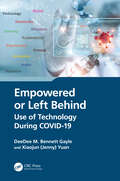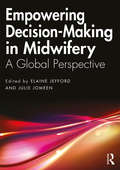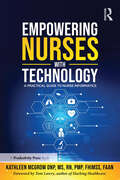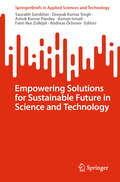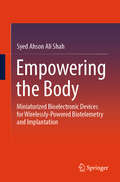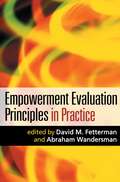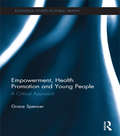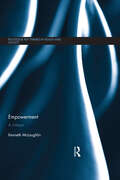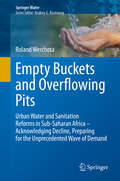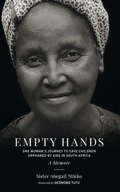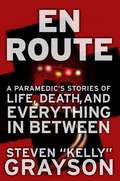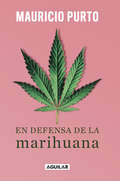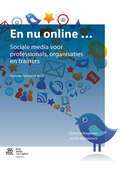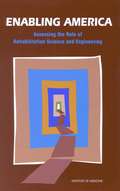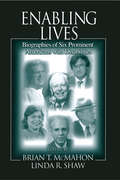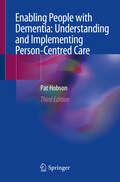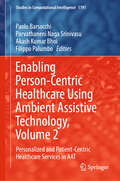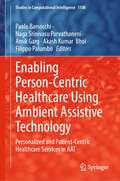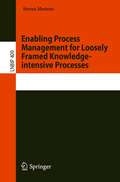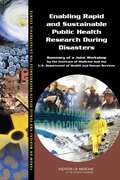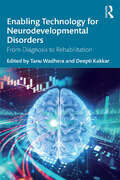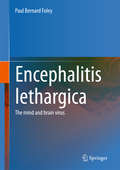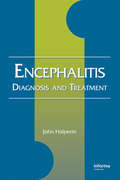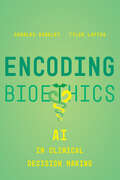- Table View
- List View
Empowered or Left Behind: Use of Technology During COVID-19
by DeeDee M. Bennett Gayle Xiaojun (Jenny) YuanFocused on the United States, this book summarizes the secondary impacts of COVID-19 due to the increased use of technology. Establishing the global response of social distancing, mandates for non-essential business, and working from home, the book centers on the disparate guidance provided domestically at the state and local levels. Marginalized populations are highlighted to identify areas where technology facilitated access and reach or contributed to difficulties catapulted by digital literacy or digital access issues. To explain how people may have been empowered or left behind due to a new and unique reliance on technology, this book is structured based on the social determinants of health domains. Specifically, this book explains how technology was an umbrella domain that impacted every aspect of life during the pandemic including access, use, adoption, digital literacy, and digital equity, as well as privacy and security concerns. Given this book’s focus on the impacts to marginalized populations, there is a thread throughout the book related to the use of technology to perpetuate hate, discrimination, racism, and xenophobic behaviors that emerged as a twin pandemic during COVID-19. Part I explains the defining differences between primary and secondary impacts, as well as the unique guidelines adopted in each state. Part II of the book is focused on specific domains, where each chapter is dedicated to topics including economic stability through employment, education, healthcare, and the social/community context through access to services. Part III focuses on unique technological considerations related to COVID-19, such as mobile health-related apps and privacy or security issues that may have posed barriers to the adoption and use of technology. Finally, the book ends with a conclusion chapter, which explicitly explains the advantages and disadvantages of technology adoption during COVID-19. These exposed benefits and challenges will have implications for policies, disaster management practices, and interdisciplinary research.
Empowering Decision-Making in Midwifery: A Global Perspective
by Elaine Jefford Julie JomeenDecision-making pervades all aspects of midwifery practice across the world. Midwifery is informed by a number of decision-making theories, but it is sometimes difficult to marry these theories with practice. This book provides a comprehensive exploration of decision-making for midwives irrespective of where in the world they practice or in which model of care. The first part critically reviews decision-making theories, including the Enhancing Decision-making Assessment in Midwifery (EDAM) tool, and their relevance to midwifery. It explores the links between midwifery governance, including professional regulation and the law, risk and safety and decision-making as well as how critical thinking and reflection are essential elements of decision-making. It then goes on to present a number of diverse case studies, demonstrating how they interrelate to and impact upon optimal midwifery decision-making. Each chapter presents examples that show how the theory translates into practice and includes activities to reinforce learning points. Bringing together a diverse range of contributors, this volume will be essential reading for midwifery students, practising midwives and midwifery academics.
Empowering Nurses with Technology: A Practical Guide to Nurse Informatics
by Kathleen McGrowNursing informatics is the specialty that integrates nursing science with multiple information management and analytical sciences to identify, define, manage, and communicate data, information, knowledge, and wisdom in nursing practice. It allows nurses to deliver evidence-based and patient-centered care, improve human health, and advance medical research. It also enhances clinical workflows so that nurses and other personnel can care for patients more efficiently and effectively.Some of the benefits of nursing informatics include a reduction in medical errors, lowered costs, improved nurse productivity, and better care coordination among nurses, physicians, pharmacists, and others throughout various care stages. Empowering Nurses with Technology: A Practical Guide to Nurse Informatics is a comprehensive guidebook for nurses and healthcare professionals looking to understand the role of technology in modern nursing practices. This book covers the basics of healthcare technology, including electronic health records (EHRs), telehealth, and mobile health applications. This book offers practical advice for implementing technology in nursing workflows, as well as strategies for training and engaging nursing staff in the use of new technology. It also explores the impact of technology on patient care and outcomes, discussing topics such as patient safety, privacy, and data security.This book provides a useful resource for nurses seeking to leverage technology to improve the quality and efficiency of their care while also enhancing their professional development and job satisfaction.
Empowering Solutions for Sustainable Future in Science and Technology (SpringerBriefs in Applied Sciences and Technology)
by Andreas Öchsner Azman Ismail Ashok Kumar Pandey Fatin Nur Zulkipli Deepak Kumar Singh Saurabh SambhavThis book, embarks the reader on a journey into the forefront of innovation where science, engineering, and technology converge to address the pressing challenges of our time. Through a captivating exploration of cutting-edge research, real-world case studies, and visionary insights, this book illuminates the dynamic forces shaping our collective journey towards a more sustainable and prosperous future. The book also explores how breakthroughs in science, engineering, and technology are reshaping our world for the better. This book is beneficial for research scholar, undergraduate and postgraduate students, or industry staff. The book inspires and empowers readers to become catalysts for positive transformation in our communities and beyond.
Empowering the Body: Miniaturized Bioelectronic Devices for Wirelessly-Powered Biotelemetry and Implantation
by Syed Ahson ShahEmbark on a groundbreaking journey into the realm of miniaturized bioelectronic devices with "Empowering the Body." This captivating book delves into the world of wirelessly-powered biotelemetry and implantation, offering unparalleled insights into the future of healthcare monitoring. Discover the motivations driving the development of wireless implantable medical devices (WIMDs) and the challenges faced in their design. Unravel the mysteries behind biocompatibility, size miniaturization, patient safety, and impedance mismatches. Witness the innovative solutions that optimize performance and extend battery life, all while ensuring the utmost precision in therapy and treatment. Featuring state-of-the-art research, this book showcases cutting-edge advancements in miniaturized implantable antenna systems, ultra-small batteryless WIMDs, and deeply implanted stent antenna systems for endovascular aneurysm repair. Immerse yourself in a world of simulations, numerical analyses, and validation experiments, where the proposed systems are rigorously tested and proven to excel in heterogeneous human body tissue environments. "Empowering the Body" caters to a diverse audience of researchers, engineers, and medical professionals at the forefront of bioelectronic devices and wireless power transfer. Whether you're an expert in the field or a graduate student seeking knowledge, this book is your key to unlocking the potential of wireless healthcare solutions. Open the pages of this exceptional book and explore its unique approach, combining theoretical insights with practical applications. Gain a comprehensive understanding of how to overcome the limitations of current technologies, and be inspired by the possibilities that lie ahead. Don't miss your chance to be at the forefront of the biomedical revolution with "Empowering the Body."
Empowerment Evaluation Principles in Practice
by David FettermanWhat principles should guide an empowerment evaluation? And how can these principles actually be put into practice? One of the primary tasks in an empowerment evaluation (EE) is to increase the capacity of program stakeholders to plan, implement, and evaluate their own programs. This book presents the most current formulation of the 10 principles of EE and provides professionals and students with the tools to put these principles into practice. Through case studies of diverse evaluation projects--including community health foundation initiatives, school district programs, and a $15 million corporate program aimed at bridging the digital divide--the founder and leading proponents of EE clarify key concepts and discuss important lessons learned. Coverage includes how to balance program improvement efforts with accountability requirements; how EE can be used to guide standards-based work; how to use EE in a learning organization; the differences among empowerment, collaborative, and participatory evaluation; and much more.
Empowerment, Health Promotion and Young People: A Critical Approach
by Grace SpencerGlobally, young people’s health is an increasing priority area for health practitioners, policy-makers and researchers, and concepts of empowerment feature strongly in international public health discourses on young people’s health. Yet the concept of empowerment remains under-theorized, and its relationship to young people’s health is not well understood. This innovative volume critically examines the concept of empowerment and its relationship to young people’s health. Empowerment, Health Promotion and Young People is set out in two main parts. Part one examines differing conceptions of power and empowerment and how these concepts have been variously defined and used in relation to young people’s health and health promotion. Part two offers a new theoretical framework for understanding empowerment as it relates to young people’s health. Drawing together key works in the field and findings from an empirical enquiry on young people’s health, this framework looks at health as it is defined by young people themselves, and offers new directions for empowerment, and critical insights into the field of young people’s health and health promotion. Critically engaging with the concept of power and opening up the debate about the relevance and effectiveness of using contemporary understandings of empowerment to promote health, this book is suitable for researchers and students of health, sociology, education and youth studies interested in young people’s health and health promotion.
Empowerment: A Critique (Routledge Key Themes in Health and Society)
by Kenneth McLaughlin‘Empowerment’ is a term in widespread use today and one that is often considered to be a self-evident good. Here, McLaughlin explores its emergence in the 1960s through to its rise in the 1990s and ubiquity in present day discourse and interrogates its social status, paying particular attention to social policy, social work and health and social care discourse. He argues that a focus on empowerment has superseded the notion of political subjects exercising power autonomously. This innovative volume: - Discusses the relationship between concepts of empowerment and power, as they have been understood historically. - Analyses changes in the conception and meaning of empowerment in relation to the shifting social and political landscape. - Acknowledges the positive impact empowerment strategies have had on those who have campaigned to be empowered and also on those who have saw their role as being to help empower others. - Highlights ways in which talk about empowerment can actually work in such a way as to further disempower those already marginalised. Critically examining how ‘empowerment’ has become embedded in contemporary social and political life, this work offers a discussion of the term’s multiple meanings, what it actually entails, and how it constructs and positions those being empowered and those empowering.
Empty Buckets and Overflowing Pits: Urban Water and Sanitation Reforms in Sub-Saharan Africa – Acknowledging Decline, Preparing for the Unprecedented Wave of Demand (Springer Water)
by Roland WerchotaThis book provides a multi-level and multi-dimensional insight into urban water and sanitation development by analyzing sector reforms in Africa. With the recent events in mind - water shortages in Cape Town, widespread cholera in Haiti, mass-migration from low-income countries, etc. – it elaborates a pressing topic which is directly linked to the precarious living conditions of the urban poor in the developing countries. It is urgent to acknowledge the proposed findings and recommendations of the book which will help to improve the situation of potential refugees in their home countries with a realistic vision for the development of the most basic of all life supporting services.So many efforts to reverse the negative trend in water and sanitation development have failed or targets have been repeatedly missed by far without notable consequences for decision makers on different levels and institutions. It has unnecessarily consumed many young lives, contributed to keep billions in poverty until today and fostered discrimination of women. The knowledge gap and the confusion in the sector lined out in the book becomes evident when a national leader in a low-income country declares a state of emergency in urban water and sanitation while at the same time global monitoring publishes an access figure for urban water of over 90% for the same country. It is time to change this with an effective sector development concept for our partner countries and a more realistic discourse on global level.The book argues for a sweeping rethinking and combines extended local knowledge, lessons learned from history in advanced countries and thorough research on reforms in Francophone and Anglophone developing countries. This was possible because the writer was working in Sub-Saharan partner countries for almost 30 years as an integrated long term advisor in different sector institutions (ministry, regulator, financing basket and different sizes of utilities) and had the opportunity to cooperate closely with the main development partners.The reader has the opportunity to obtain a comprehensive understanding of how the sector works and sector institutions in low-income countries function and can discover the reasons behind success and failures of reforms. The book also covers issues which have a significant influence on urban water and sanitation development but are hardly the subject of discussions. It helps to make the shortcomings of the water and sanitation discourse more apparent and assist institutions to move beyond their present perceptions and agendas. All of this makes the book different from other literature about urban water and sanitation in the developing world.
Empty Hands, A Memoir
by Desmond Tutu Kittisaro And Thanissara Sister Abega NtlekoEmpty Hands is the inspiring memoir of Zulu nurse and healthcare activist Sister Abegail Ntleko. Growing up poor in a rural village with a father who didn't believe in educating girls, against seemingly insurmountable odds Sister Abegail earned her nursing degree and began work as a community nurse and educator, dedicating her life to those in need. "Her story tells us," says Desmond Tutu, who wrote the foreword to the book, "what a single person can accomplish when heart and mind work together in the service of others."Overcoming poverty and racism within the apartheid South African system, she adopted her first child at a time when it was unheard of to do so. And then she did it again and again. In forty years she has taken in and cared for hundreds of children who had nothing, saving babies--many of them orphans whose parents died of AIDS--from hospitals that were ready to give up on them and let them die. Empty Hands describes the harshness of Ntleko's circumstances with wit and wisdom in direct, beautifully understated prose and will appeal not only to activists and aid workers, but to anyone who believes in the power of the human spirit to rise above suffering and find peace, joy, and purpose."Ntleko's story, which she tells in simple language, is inspiring and moving. She neither dwells in nor dramatizes the hardships she has faced, preferring instead to focus on 'fill[ing] her hands with love and then spend[ing] all that love until [her] hands are empty again.' A brief, genuine, heartfelt memoir of an awe-inspiring life."--Kirkus ReviewsFrom the Trade Paperback edition.
Empty Harvest: Understanding the Link Between Our Food, Our Immunity, and Our Planet
by Bernard Jensen Mark AndersonEmpty Harvest puts together a sober picture of how interconnected man is to the earth, and how this connection is being destroyed. But the book also offers a wide range of practical, long-term solutions that are still available to us.
En Route: A Paramedic's Stories of Life, Death, and Everything in Between
by Steven Kelly GraysonStephen "Kelly" Grayson has seen the best of us at our worst. When hearts stop working, when blood alcohol levels exceed limits we shouldn't contemplate, when bodies are extricated from car wrecks, he's been there to pick up the pieces, save our lives, and watch us slip away. His touching stories of life and death and the hilarious ones of times in between are here to give us an insight of what happens after we call 911, the ambulance doors close, or even what happens inside the ER when the nurse shows the family to the waiting room.
En defensa de la marihuana
by Mauricio PurtoMauricio Purto aporta a la discusión sobre la marihuana tratando de derribar los mitos que la rodean Fue el primer doctor que recetó cannabis como droga medicinal en Chile. Pese a desalentar su consumo entre niños y jóvenes. Mauricio Purto realiza en este libro una encendida defensa de la marihuana desde una perspectiva científica y personal. El destacado montañista, líder de la expedición chilena que subió el Everest, echa mano de su larga y profunda experiencia, de antiquísimos textos de la medicina ayurvédica y las más innovadoras investigaciones de la ciencia actual,de estudios que se remontan a principios del siglo xx, sin dejar de lado su propio trayecto como fumador de yerba, para entregarnos un texto provocador a la vez que revelador sobre los beneficios de la marihuana.
En nu online ...: Sociale media voor professionals, organisaties en trainers
by Sibrenne Wagenaar Joitske HulseboschEn nu online ... Sociale media voor professionals, organisties en facilitatoren laat zien hoe sociale media werken. Dit wordt uitgebreid geïllustreerd aan de hand van praktijkvoorbeelden en - verhalen
Enabling America: Assessing the Role of Rehabilitation Science and Engineering
by Andrew M. Pope Edward N. BrandtThe most recent high-profile advocate for Americans with disabilities, actor Christopher Reeve, has highlighted for the public the economic and social costs of disability and the importance of rehabilitation. Enabling America is a major analysis of the field of rehabilitation science and engineering. The book explains how to achieve recognition for this evolving field of study, how to set priorities, and how to improve the organization and administration of the numerous federal research programs in this area.The committee introduces the "enabling-disability process" model, which enhances the concepts of disability and rehabilitation, and reviews what is known and what research priorities are emerging in the areas of: Pathology and impairment, including differences between children and adults. Functional limitations--in a person's ability to eat or walk, for example. Disability as the interaction between a person's pathologies, impairments, and functional limitations and the surrounding physical and social environments. This landmark volume will be of special interest to anyone involved in rehabilitation science and engineering: federal policymakers, rehabilitation practitioners and administrators, researchers, and advocates for persons with disabilities.
Enabling Lives
by Linda R. Shaw Brian T. McMahonEnabling Lives provides a look at the disability civil rights movement through an intimate portrayal of the lives of several of its key leaders. Each of the chapters of this book is a separate authorized biography of such prominent figures as Frank Bowe, Tony Coelho, Justin Dart, Judy Heumann, Evan Kemp, and Harold Russell. Enabling Lives provides not only an accurate historical record of key moments in the development of civil rights for individuals with disabilities, but also invites the reader to become acquainted with the individuals who helped to shape the movement and to view history in the making through the eyes of those who were helping to create it.Each of the book's subjects has provided countless hours of interviews, recollections and "war stories" into the making of this important work, helping to create a legacy that hopefully will be carried on by the current and future leaders of the movement.
Enabling People with Dementia: Understanding And Implementing Person-centred Care
by Pat HobsonThis new updated edition challenges the perceptions, beliefs and attitudes of professionals working in dementia care settings by drawing on the theory of person-centred care. It demonstrates the importance of this theory for interacting with and caring for people with dementia. It also provides an overview of the theory in relation to two other well-known theories on dementia, and stresses the need to consider the world from the perspective of people with dementia. Moreover, the book examines the importance of dementia care environments, positive interactions, meaningful activities and the concept of personhood, which are all essential to improving the health and wellbeing of people living with dementia. In closing, it underscores the need to remember that the focus of care should be on maximizing the person’s abilities, enabling them, and promoting person-centred care. Given its content and style, the book offers a resource that can be read and understood by health and social care professionals alike, as well as anyone else caring for someone with dementia, including family members and carers.
Enabling Person-Centric Healthcare Using Ambient Assistive Technology, Volume 2: Personalized and Patient-Centric Healthcare Services in AAT (Studies in Computational Intelligence #1191)
by Akash Kumar Bhoi Paolo Barsocchi Filippo Palumbo Parvathaneni Naga SrinivasuThis book focuses more on the transformative impact of person-centric health care, where it explores cutting-edge advancements in integrating artificial intelligence and machine learning to deliver personalized and efficient care. Key topics include the application of predictive models for critical health conditions such as brain stroke, lung cancer, diabetes, and Alzheimer's, as well as the integration of secure frameworks to protect sensitive patient data. The book also covers advanced techniques for recognizing human activities in ambient environments, optimizing patient data clustering, and evaluating deep learning methods for unique use cases like yoga pose classification and resource optimization in smart healthcare. Designed for healthcare professionals, researchers, data scientists, and technologists, this book presents a harmonious blend of technical insights and practical applications, emphasizing person-centric approaches. By focusing on multi-disease prediction, assistive technologies, and enhanced emergency management, this book serves as a vital resource for innovating healthcare delivery in smart environments.
Enabling Person-Centric Healthcare Using Ambient Assistive Technology: Personalized and Patient-Centric Healthcare Services in AAT (Studies in Computational Intelligence #1108)
by Akash Kumar Bhoi Amik Garg Paolo Barsocchi Naga Srinivasu Parvathaneni Filippo PalumboThis book experiences the future of patient-centered healthcare and dives into the latest advancements and transformative technologies that are revolutionizing the well-being of individuals around the globe. The readers can join authors on an engaging journey as the authors explore the captivating realm of ambient assisted living and unlock its immense potential for improving healthcare outcomes. This book goes beyond mere exploration; it invites readers to embark on a voyage of discovery as authors unveil the outcomes of groundbreaking research ideas. With a diverse range of applications, from deep learning in healthcare to cutting-edge models, the authors offer a comprehensive view of the opportunities and challenges that lie ahead. Whether you're a healthcare professional, an academic seeking the latest insights, or a researcher delving into the realms of ambient assistive technology, biomedical engineering, or computational intelligence, this book is an invaluable resource. Additionally, postgraduate students pursuing data engineering systems find it to be an essential guide. Each chapter stands independently, providing a comprehensive overview of problem formulation and its tangible outcomes. The readers can immerse themselves in the world of patient-centered healthcare today and become part of the forefront of innovation.
Enabling Process Management for Loosely Framed Knowledge-intensive Processes (Lecture Notes in Business Information Processing #409)
by Steven MertensThis book is a revised version of the PhD dissertation written by the author at the Department of Business Informatics and Operations Management at Ghent University in Belgium.It addresses shortcomings in Business Process Management concerning loosely framed knowledge-intensive processes, which are characterized by their numerous valid process variants and their reliance on knowledge workers to apply their knowledge to decide on a suitable process variant that fits the context of a specific process execution. The goal was to lay the foundation for a process-aware business process management (IT-)system to support such processes. Several proof-of-concept implementations have been made for the core components and were evaluated in the domain of the healthcare. Starting from an artificial, but realistic, case about patients that arrive in the emergency room with suspected arm fractures and later progressing to a case study of the diagnosis and treatment of patients in the emergency department of a real hospital, using data from their patient files. In 2020, the PhD dissertation won the “CAiSE PhD award”, granted to outstanding PhD theses in the field of Information Systems Engineering.
Enabling Rapid and Sustainable Public Health Research During Disasters: Summary of a Joint Workshop by the Institute of Medicine and the U.S. Department of Health and Human Services
by Megan ReeveOver the past decade, preparedness and response capacities of government agencies, hospitals and clinics, public health agencies, and academic researchers in the United States and abroad have been challenged by a succession of public health emergencies, ranging from radiological threats to pandemics to earthquakes. Through After Action Reports, each of these emergencies has yielded important information and lessons learned that can inform future disaster response and recovery efforts. However, important information that needs to be collected during and immediately following these emergencies is often missed because of barriers and obstacles to gathering such data, such as varying institutional review board restrictions in different states, no sustainable funding network for this type of work, uncertainty on who should be involved in research response, and a lack of knowledge around how best to integrate research into response and recovery frameworks. Taking action to enable medical and public health research during disasters was the focus of a workshop held on June 12 and 13, 2014, coordinated and supported jointly by the Institute of Medicine Forum on Medical and Public Health Preparedness for Catastrophic Events, National Institute of Environmental Health Sciences, the National Library of Medicine, the U. S. Department of Health and Human Services' Office of the Assistant Secretary for Preparedness and Response, and the Centers for Disease Control and Prevention. Invited speakers and participants from federal, state, and local government, academia, and community and worker organizations came together to discuss how to integrate research into existing response structures; identify critical research needs and priorities; identify obstacles and barriers to research; discuss structures and strategies needed for deployment of a research study; share ideas, innovations, and technologies to support research; and explore data collection tools and data-sharing mechanisms for both rapid and longitudinal research. "Enabling Rapid and Sustainable Public Health Research During Disasters" summarizes the presentations and discussion of the workshop.
Enabling Technology for Neurodevelopmental Disorders: From Diagnosis to Rehabilitation
by Tanu WadheraThis cutting-edge volume explores how technological tools can be designed, engineered and implemented to assess and support individuals with neurodevelopmental disorders from diagnosis through to rehabilitation. Tanu Wadhera and Deepti Kakkar and their expert contributors focus on technological tools as equalizers in Neurodevelopmental disorders (NDDs) at every stage, the importance of demand-specific design, and how we can best engineer and deploy both invasive and non-invasive individual-centered approaches that support and connect individuals. Considering the perspectives of patients, clinicians and technologists, it explores key topics including design and evaluation of platforms for tech-tools, automated diagnosis, brain imaging techniques, tech-diagnostic frameworks with AI and machine learning, sensing technology, smart brain prosthetics, gamification, alternative communication devices, and education tools and interactive toys. Outlining future challenges for research, Enabling Technology for Neurodevelopmental Disorders is useful for scholars and professionals in psychology, technology, engineering and medicine concerned with design, development and evaluation of a range of assistive technological tools.
Encephalitis Lethargica
by Paul Bernard FoleyEncephalitis lethargica (‘sleeping sickness’) was a mysterious disorder that swept the world in the decade following the First World War, before disappearing without its cause having been identified. Around 85% of its victims, predominantly children, adolescents and younger adults, survived the acute disorder, but most developed severe neurological syndromes, particularly severe post-encephalitic parkinsonism and other severe motor abnormalities, that incapacitated them for the remainder of their lives. Despite its brief history, encephalitis lethargica played a major role in a variety medical discussions between the two World Wars, as this epitome of neuropsychiatric disease – attacking both motor and mental functions – appeared just as the separation of neurology and psychiatry had reached a critical point. Encephalitis lethargica sufferers presented an unprecedented combination of neurologic and psychiatric symptoms – including previously puzzling phenomena primarily associated with schizophrenia and hysteria, as well as behavioral changes and attention deficit disorders in children – that not only underscored the unity of mind and movement in the CNS, but also illuminated the critical role played by subcortical structures in consciousness and other higher mental functions that had formerly been associated with the soul and more recently presumed to be localized to the human cerebral cortex. Encephalitis lethargica exerted a greater influence on clinical and theoretic neuroscientific thought between the two World Wars than any other single disorder and had an enduring impact upon neurology and psychiatry. This book will be of interest to an educated audience active or interested in clinical (neurology, psychiatry, psychology) or laboratory neuroscience, particularly those interested in neuropsychiatry, as well as to those interested in the history of the biomedical sciences.
Encephalitis: Diagnosis and Treatment (Neurological Disease and Therapy)
by John J. HalperinInflammation of the brain, usually brought on by a viral infection, encephalitis currently poses a grave threat to patients around the world. With the migration of West Nile virus into North America, there is a greater awareness and corresponding need to understand, diagnose, and manage this illness. In Encephalitis: Diagnosis and Treatment, expert
Encoding Bioethics: AI in Clinical Decision-Making
by Charles Binkley Tyler LoftusEncoding Bioethics addresses important ethical concerns from the perspective of each of the stakeholders who will develop, deploy, and use artificial intelligence systems to support clinical decisions. Utilizing an applied ethical model of patient-centered care, this book considers the viewpoints of programmers, health system and health insurance leaders, clinicians, and patients when AI is used in clinical decision-making. The authors build on their respective experiences as a surgeon-bioethicist and a surgeon–AI developer to give the reader an accessible account of the relevant ethical considerations raised when AI systems are introduced into the physician-patient relationship.
